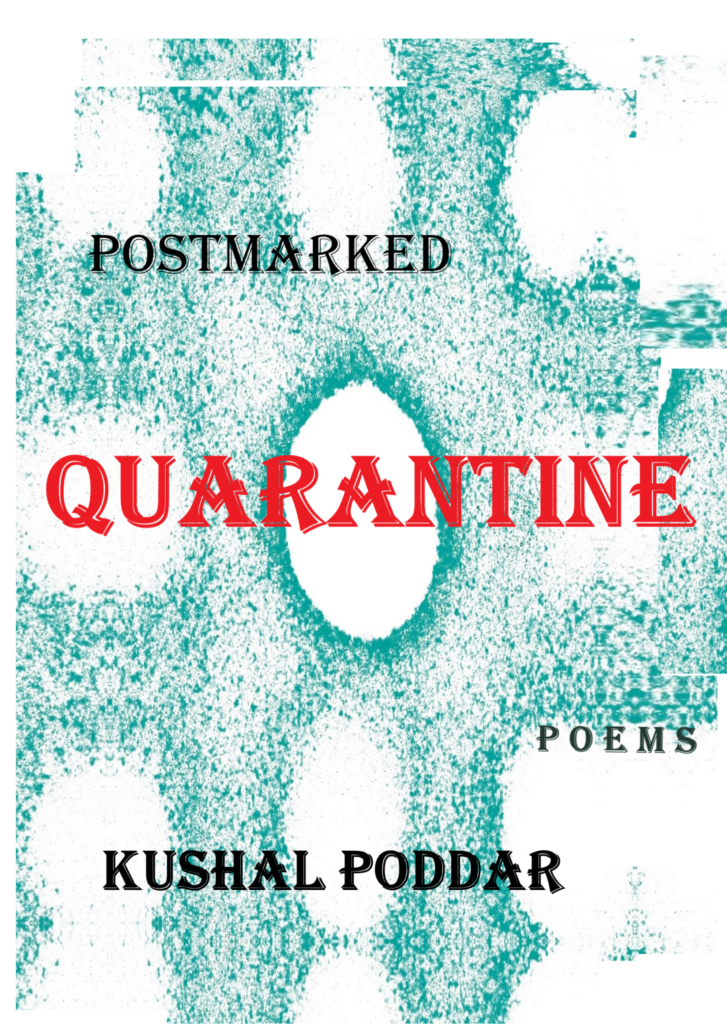
Why We Created an Anti-Prize: On Poetry Awards, Indie Presses, and the Myth of Prestige
Poetry prizes are everywhere. So are prize-nominated books, prize-listed poets, and presses (not so) quietly using awards as a marketing strategy. Ugh!

Kushal Poddar’s Postmarked, Quarantine is a modern poetry collection, but it’s also a lived fever dream, bottled and postmarked from the darkest months of lockdown. This is no soft-focus elegy for a “lost year.” It’s a raw, often surreal excavation of psychic breakdown, dislocated intimacy, and the bizarre rituals of survival in contemporary poetry’s most claustrophobic diary. Poddar dismantles the pandemic experience day by day, his language sharpening like a scalpel and then turning, without warning, into velvet. For wide readers of contemporary poetry, this isn’t just another plague book. It’s a slow, exacting descent into the private hells we all tried to make palatable.
The collection’s power lies in its refusal to tidy up the mess of trauma. In Day Seventy-Two – One Long Drive, Poddar writes, “Under my car’s bonnet, my father clears his throat. From the booty, my wife’s voice / discusses something with my mother’s silence.” It’s an unnerving line that warps space and time, grief becomes cargo, ancestry a muffled radio channel playing in the dark. The metaphor isn’t pretty; it’s psychologically loaded. The domestic is reimagined as both prison and séance, and the poem hums with dread like a car idling outside a bad motel. This isn’t about crafting a lyrical COVID memoir. It’s about turning hallucination into architecture.
Thematically, Poddar interrogates the concept of presence and absence with forensic intensity. In Day Fifty-Five – After Quarantine Chicken Salad, we get: “The chicken salad your grandmother makes these days / features no chicken in it.” What could’ve been a cheap metaphor is turned inside out. The absence of meat becomes a generational elegy, a poverty of both sustenance and spirit. The poem closes with a child being told to “digest the protein from this dinner” even when there is none. Hope, here, is a cruel nutrient, and memory the only garnish. This is literary analysis at its most vital, the emotional truth isn’t in what’s said, but in what’s withheld.
Formally, Poddar balances journal-entry immediacy with an almost theatrical lyricism. Day Sixty – Mental Ball – II offers: “two hands exploding inside out / through your maws… you know this process as an implosion.” It’s grotesque and mythic in the same breath. The body here is no longer sanctuary, it’s a site of existential protest. The poem is compact, but its implications are vast: trauma internalises until it bursts, yet nobody sees the damage. The poet’s restraint here is what elevates the piece. Instead of overwriting the metaphor, he lets the image fester, letting the reader feel its unease.
Taken as a whole, Postmarked — Quarantine sits within the wider landscape of contemporary poetry like a seditious whisper. It refuses the clean lines of American confessionalism and instead aligns more closely with writers who blend autobiography with fabulist vision, those who understand that language under duress mutates. In terms of independent publishing, Ice Floe Press deserves credit for curating such a singular voice without polishing its edges for mass appeal. For readers hungry for a poetry anthology that captures not just the facts of lockdown but its disintegrated rhythms and fugitive images, this is a rare and necessary offering.
About the Author

The author of ‘Postmarked Quarantine’ has eight books to his credit. He is a journalist, father, and the editor of ‘Words Surfacing’. His works have been translated into twelve languages, published across the globe.

Poetry prizes are everywhere. So are prize-nominated books, prize-listed poets, and presses (not so) quietly using awards as a marketing strategy. Ugh!

On Saturday 31 January 2026, The Broken Spine Live rolls back into Southport for an evening of raw words and real ale,

Gig Review: Stereophonics at M&S Bank Arena, Liverpool – 16 December 2025 I have loved Stereophonics since the day I bought Local
The Broken Spine is a poetry and arts collective proudly published on the coastal edge of North-West England. Founded in 2019 by Alan Parry and Paul Robert Mullen – two school friends reunited after twenty years through a mutual love of poetry.